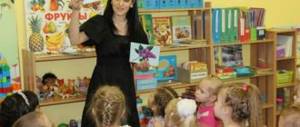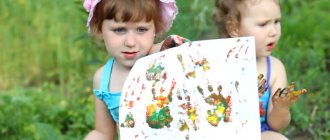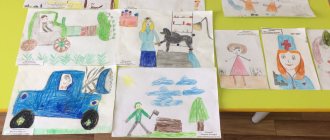Middle group. Junior preschool age. Children 4 - 5 years old
Summary of a lesson on speech development in the middle group “Dog with puppies” Municipal budgetary preschool educational institution, kindergarten No. 143 for care and wellness Summary of a lesson on speech development on the topic : Storytelling based on the picture “Dog with puppies”
Conducted by: secondary school teacher Kemerovo 2020 Goal: developing children’s skills...
Summary of a lesson on speech development in the middle group “Learning the poem by S. Marshak “April” Synopsis of a lesson on speech development in the middle group “Learning the poem by S. Marshak “April”
Olga Barbarosh
Summary of a lesson on speech development in the middle group “Learning the poem by S. Marshak “April”
Goal: to learn the poem by S. Marshak
“April”
Objectives:...
Speech development in the middle group of preschool educational institutions
The development of communication and speech skills, which includes enriching vocabulary and developing clear pronunciation, is considered one of the main tasks for preschoolers.
Speech development lesson
Note! For the correct speech development of children in the middle group, educators do a tremendous amount of work. It is based on a set of special exercises and methodological techniques aimed at improving speech skills and developing a high culture and politeness of speech.
To develop speech in the middle group of preschool educational institutions, various directions are used:
- children’s knowledge and ideas about surrounding objects deepen;
- children become familiar with the details and names of parts of things;
- words denoting the properties of objects and phenomena are studied;
- vocabulary in the field of professions is replenished;
- words that denote relationships between people are studied;
- children learn to express their own thoughts in complex sentences that are grammatically correct.
To solve the assigned tasks in the middle group, the teacher must take a responsible approach to the process and purposefully conduct classes.
Federal State Educational Standards requirements for speech development
All educational institutions, regardless of whether they are public or private, must focus on certain program requirements that are specified in the Federal State Educational Standard.
As for the speech development of preschoolers, the requirements are as follows:
- Vocabulary must be constantly enriched;
- the child must have speech skills in accordance with age;
- the sound and intonation range of speech expressiveness should expand;
- develop the ability to perceive sounds by ear and at the same time hear, identify and, if there are errors, correct them;
- develop the ability to listen and remember the storyline;
- develop logically consistent and meaningful speech;
- skills of retelling and acting out dialogues;
- the child must learn to convey the meaning emotionally and read a poem by heart with expressiveness;
- work should be carried out to expand the horizons of preschoolers about objects, properties, phenomena and the concept of a coordinate system;
- generalizing concepts are introduced into the lexicon;
- training is provided to improve the grammatical construction of sentences.
Note! All training sessions should be conducted by the teacher so that they simultaneously include solving assigned problems and game moments. Only in this case will it be possible to interest children and achieve the desired results.
Directions of speech development (FSES DO)
Age-related psychological characteristics of children in the middle group of preschool educational institutions
In terms of development, middle preschool age is a continuation of early childhood. During this period, children master the world of permanent things, master the culture of speech, and the formation and development of psychological perception also occurs.
In middle age, children continue to actively develop speech, substitution ability, thinking and imagination. With the help of speech, middle group students express their emotions and share their impressions.
Note! There is a rapid development of memorizing information and retaining it in memory, and the ability to concentrate is also enhanced.
As a rule, at this age, kindergarten teachers conduct special planned classes on speech development. They are provided for by special educational standards. But, despite this, pedagogical work in this direction is not limited to a certain framework. The most important thing is that when selecting tools, the teacher must take into account all the age characteristics of his students.
Analysis of a frontal lesson with a speech therapist at a preschool educational institution
Methodological tools
Within the framework of the requirements of speech development, the teacher faces serious tasks that force him to approach the process thoughtfully, responsibly and in accordance with certain standards.
Basic pedagogical techniques
Each lesson on speech development in the middle group should be based on a specific pedagogical technique. Currently, three main groups of speech development techniques in preschool institutions have been identified. These are verbal, visual and playful techniques.
Their essence is as follows:
- Teaching stories using story pictures.
- Daily reading of fiction, which is provided for in the educational program.
- Carrying out work with children in a conversation format.
- Application of gaming technologies.
- Systematic and unobtrusive repetition of a new word.
- Motivation to complete the curriculum.
Note! In addition to implementing the pedagogical techniques listed above, the teacher must organize physical education sessions for students. They are also part of the curriculum and help to develop a serious attitude towards physical education in children.
Games for speech development
By the age of five, children should learn to pronounce all sounds correctly. You can achieve your goal through daily breathing exercises.
Didactic games on “Speech Development”
You can form grammatically correct speech thanks to games and exercises:
- "More less".
- “Call me kindly.”
- “Whose toy?”
- “Continue the sentence.”
- "Which".
Speech corner equipment
In order to stimulate independence and informal playful communication with children, in accordance with the requirements of the Federal State Educational Standard, an aesthetically attractive, comfortable and special subject-development environment must be created in which children will not be afraid, but rather feel at ease and at ease.
Important! It is best to place the speech corner away from the playing area in a well-lit place. It must be equipped with didactic and visual aids, as well as the necessary materials that are used by the teacher during classes.
Speech corner
Table: filling out the speech corner by section
| Chapter | Content |
| Certificate | Schemes of words, sentences and corresponding games (“Add a word”, “Choose a word”), puzzles and crosswords. |
| Connected speech | Subject pictures, “Playing in the profession”, “Guess by the description”. |
| Grammar | Games “Name it affectionately”, “One-many”. |
| Vocabulary | Pictures, lotto, puzzles. |
| Sound pronunciation | Game exercises, games to automate sounds. |
| Breath | Pipes, bubbles, balloons for inflation. |
| Fine motor skills | Pencils, puzzles, mosaics, tops. |
| Phonetic hearing | Sound differentiation games. |
| Articulation gymnastics | Pictures, sets of exercises, methodological literature. |
| Higher mental functions | Dominoes, cut pictures. |
Note! Among other things, experts recommend having Ushakova’s book “Speech Development” in the speech corner. It examines in detail all the problems of speech development for children in the middle group, selects methodological recommendations and compiles lesson notes.
Individual lessons for children aged 5 years
Individual classes with a group teacher differ both from regular classes in a group (frontal and subgroup) and from classes with specialized specialists: speech therapist, psychologist, etc.
Duration of classes in the middle group
If a lesson with a speech therapist or psychologist with one or two pupils can last as usual, about 20 minutes, then it is difficult to organize individual work with children by a teacher of such a duration. After all, his main responsibility is to ensure the safety of the children’s life and health throughout the entire work shift, to organize and direct their activities in a useful and safe direction.
The nanny cannot always replace the teacher and take control of the rest of the children, so the teacher carries out individual work in the form of individual educational situations, short didactic games that will not prevent him from monitoring the behavior of all the children. It can last 3 or 7 minutes, depending on what the other children are interested in and how many of them are in the group at the moment. When teaching even one child, the teacher must keep all children in sight. This rule is especially important in the middle group, when the guys become restless, strive to explore, find out everything, and are very active and energetic.
Number of children in class
In contrast to frontal classes (with the whole group) and subgroups, which take from 4 to 10 people, individual classes are conducted with one child or a mini-subgroup of no more than three children who have similar compensatory or developmental needs. The teacher must think in advance where and how he will position himself with the child, so that the rest of the kids are in sight and at the same time do not interfere with the lesson.
Who to spend it with
They plan and carry out individual work with each of the children in turn. Why not only those who excel or fall behind in classes?
The division of group pupils into ordinary, gifted and retarded is not entirely incorrect. The Federal State Educational Standard does not set goals for preschoolers that they are required to achieve, but only provides targets for teachers to plan and determine areas of work. The Federal Standard emphasizes that preschoolers are not responsible for the results of their activities in the educational process; each child grows and develops freely, naturally to the extent of his or her mental and physical characteristics (flexibility and plasticity of development).
Only those children who cope with tasks faster and better should not be considered gifted; perhaps they simply have faster thinking and are easier to make contact with. Children who are shy and have a slow temperament are often considered to be lagging behind. This is a serious pedagogical mistake. It should be remembered that all preschoolers are individuals gifted with one or another talent that should be discovered and protected.
You can’t say: “Katya and Kolya are talented because they sing beautifully, and Tanya is gifted because she knows how to quickly solve riddles. Styopa is lagging behind: he does everything slowly, quits work halfway through, and the rest of the children are ordinary.” Without a doubt, it is good that there are talented singers in the group. But a teacher who loves children, is sensitive and tactful will find talent in every child: Ira and Olya love order and always help put away toys, Yura and Oleg know how to build beautiful houses, etc. Hard work, organization, love of animals and other positive moral qualities deserve praise no less than the ability to sing and draw. And if the child does not keep up with the other children, is distracted, inactive, perhaps he is simply in a bad mood, he is upset about something, or did not get enough sleep. In this case, it is worth talking with the baby’s family and adjusting his home routine.
Kindness and humanity are no less valuable qualities than the ability to draw or dance, and teachers should also pay attention to them
Developmental individual work in the middle group is carried out regardless of the child’s success, with everyone in turn. After all, even the most lively, easily coping children may develop some problems (with attention, perseverance, long-term memory) that require the care of a teacher.
In addition, the psychological aspect is also important here: fifth-year preschoolers are very affectionate and touchy, because they are not very good at controlling emotions. The teacher is usually a significant person for them; children seek his attention and communication. If the teacher constantly devotes more time to the same children, the rest will develop a feeling of discomfort, and possibly jealousy. But if individual work is carried out with everyone, no misunderstandings arise, because everyone is given attention in turn. It will become a routine and become habitual.
Time spending
They carry out individual work in the morning, during a walk and in the evening, after afternoon tea and games. The selection of activities and the educational area in which it is carried out depends on the timing of the activity.
In the morning, when children are relaxed after sleep, their physical and mental activity is reduced, it is not recommended to use exercises to develop movements, sound culture of speech, thinking, and logic. Conversations, short didactic games, creating an educational situation on simpler and understandable topics for children, but no less important, would be appropriate: about culture of behavior, hygiene, health care, traffic rules.
If children are received in a group, the teacher can pay attention to developing drawing skills, for example, practice with some of the students. how to hold a pencil or brush correctly, shade without going beyond the outline, and rhythmically apply strokes to a flat image of objects. In modeling, you can practice the skills of dropping a ball from a lump of clay (plasticine), dividing the lump into equal or unequal parts, applying patterns to the product with a stack or stamp. To prepare for the appliqué, the child is asked to lay out a pattern on a triangle, square, circle from ready-made shapes, and create a pattern on a strip according to the pattern. Speech warm-ups would also be useful in the morning: reciting simple sayings, nursery rhymes, and short poems.
During the daytime, while walking, children are engaged in work that does not require the removal of voluminous material and manuals. These are verbal games, exercises for attention, memory, logic, intelligence, the formation of mathematical concepts, the development of ideas about the objective world, society, and nature. A daytime walk is an excellent time to improve basic types of movements, coordination, dexterity, sense of balance, and spatial orientation.
During the walk, the teacher will take the time to conduct a short exploration of natural materials, such as sand, with one or two children
The second half of the day gives the teacher more opportunities to work with children individually. Children begin to be taken home, there are fewer of them in the group, and those who remain can be captivated by games, drawing, and looking at illustrations in children's books under the supervision of a nanny. Evening individual lessons can be a little longer, about 10–12 minutes, and they cover acceptable material (singling out sounds in a word, numbers and numbers, environmental education). However, you should focus on the condition of the children: if signs of fatigue or overexcitation are noticeable, then the lesson is curtailed.
Lesson on speech development in the middle group
Planning lessons should be carried out according to methodological recommendations.
Lessons on fairy tales
Lesson structure
Each lesson should be conducted according to a specific scheme:
- The organizational introductory part is characterized by a motivating and stimulating nature. The main task of the teacher at this stage is to get the children into the mood for work and awaken their interest in the topic.
- Practical part - the teacher sets the tasks and explains the essence of the task.
- Active work - children complete tasks in conjunction with a verbal assessment of the students’ activities.
- Summing up - the teacher’s goal is to draw children’s attention to the result.
What skills do preschoolers develop in dialogue?






